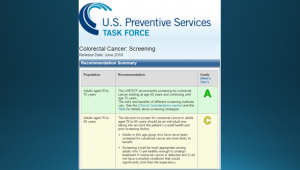 On June 15, 2016 the U.S. Preventive Services Task Force issued an update to its 2008 recommendations for colorectal cancer screening.
On June 15, 2016 the U.S. Preventive Services Task Force issued an update to its 2008 recommendations for colorectal cancer screening.
The USPSTF writes: “The USPSTF found convincing evidence that screening for colorectal cancer in adults aged 50 to 75 years reduces colorectal cancer mortality. The USPSTF found no head-to-head studies demonstrating that any of the screening strategies it considered are more effective than others, although the tests have varying levels of evidence supporting their effectiveness, as well as different strengths and limitations (Table).
 About one-third of eligible adults in the United States have never been screened for colorectal cancer, and offering choice in colorectal cancer screening strategies may increase screening uptake. As such, the screening tests are not presented in any preferred or ranked order; rather, the goal is to maximize the total number of persons who are screened because that will have the largest effect on reducing colorectal cancer deaths.”
About one-third of eligible adults in the United States have never been screened for colorectal cancer, and offering choice in colorectal cancer screening strategies may increase screening uptake. As such, the screening tests are not presented in any preferred or ranked order; rather, the goal is to maximize the total number of persons who are screened because that will have the largest effect on reducing colorectal cancer deaths.”
Evidence Review The USPSTF reviewed the evidence on the effectiveness of screening with colonoscopy, flexible sigmoidoscopy, computed tomography colonography, the guaiac-based fecal occult blood test, the fecal immunochemical test, the multitargeted stool DNA test, and the methylated SEPT9 DNA test in reducing the incidence of, and mortality from, colorectal cancer or all-cause mortality; the harms of these screening tests; and the test performance characteristics of these tests for detecting adenomatous polyps, advanced adenomas based on size, or both, as well as colorectal cancer. The USPSTF also commissioned a comparative modeling study to provide information on optimal starting and stopping ages and screening intervals across the different available screening methods.
Findings The USPSTF concludes with high certainty that screening for colorectal cancer in average-risk, asymptomatic adults aged 50 to 75 years is of substantial net benefit. Multiple screening strategies are available to choose from, with different levels of evidence to support their effectiveness, as well as unique advantages and limitations, although there are no empirical data to demonstrate that any of the reviewed strategies provide a greater net benefit. Screening for colorectal cancer is a substantially underused preventive health strategy in the United States.
Conclusions and Recommendations The USPSTF recommends screening for colorectal cancer starting at age 50 years and continuing until age 75 years (A recommendation). The decision to screen for colorectal cancer in adults aged 76 to 85 years should be an individual one, taking into account the patient’s overall health and prior screening history (C recommendation).


